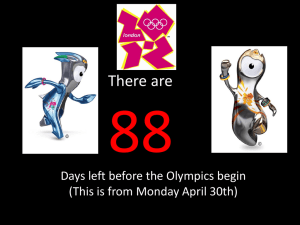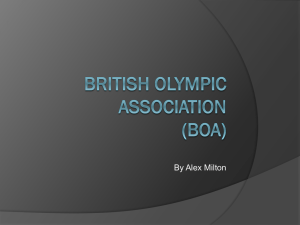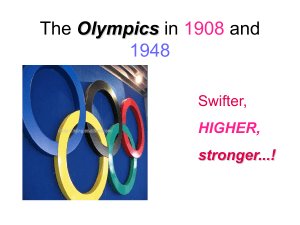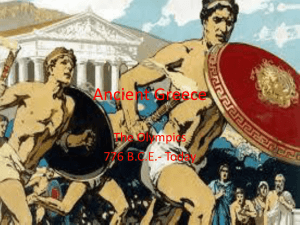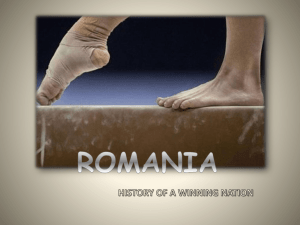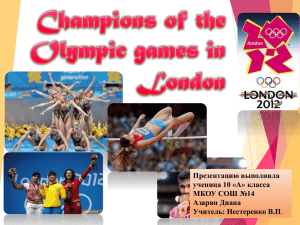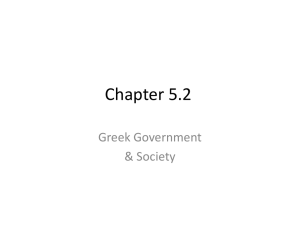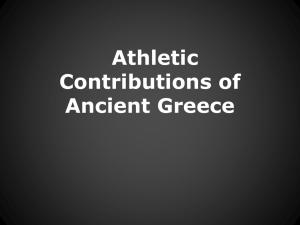OLYMPICS - WordPress.com
advertisement
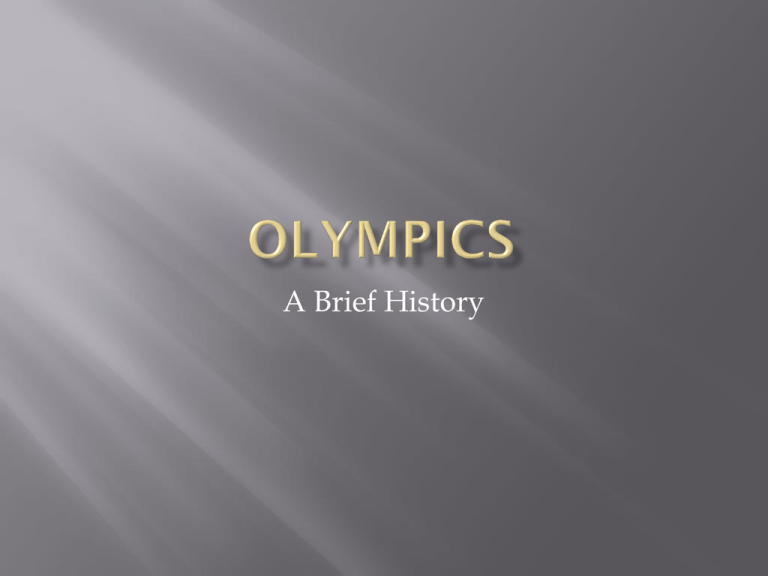
A Brief History In 776 B.C. the first Olympics were held in Europe at Olympia, Greece. Olympia was a sanctuary dedicated in honor of Zeus, the father of all Greek Gods and Goddesses. The games were part of a religious festival. New English Treasure/Projects • The Olympic Games were held at Olympia in ancient Greece. GREECE Olympia That is why they were called ‘Olympic’. The earliest myths regarding the origin of the games are recounted by the Greek historian, Pausanias. According to the story, Herakles (not to be confused with the son of Zeus) and four of his brothers, Paeonaeus, Epimedes, Iasius and Idas, raced at Olympia to entertain the newborn Zeus. He crowned the victor with an olive tree wreath, (which thus became a peace symbol) which also explains the four year interval, bringing the games around every fifth year (counting inclusively). The other Olympian gods (so named because they lived permanently on Mount Olympus), would also engage in wrestling, jumping and running contests.] New English Treasure/Projects • The Olympic Games were held at Olympia in ancient Greece. • They were part of a religious festival to worship the god Zeus. The statue of Zeus at Olympia was one of the seven wonders of the ancient world. New English Treasure/Projects The ancient Olympic Games • The Olympic Games were held at Olympia in ancient Greece. • They were part of a religious festival to worship the god Zeus. • The first Games were held in 776 BC. There was just one event, a race of one stadium length (about 192 m). New English Treasure/Projects The ancient Olympic Games • The ancient Olympic Games were held to worship the god Zeus. • They took place every four years at Olympia, in ancient Greece. • The first Games were held in 776 BC. • The last Games were in AD 394. Later, much of Olympia was destroyed by an earthquake. Olympian assembly, from left to right: Apollo, Zeus and Hera. Etruscan red-figure calyx-krater, 420–400 BC. From Etruria. Late Archaic terracotta statue of Zeus and Ganymede, Olympia Archaeological Museum Ancient Olympics Way of honoring their gods A religious celebration on honor of Zeus Olympia – ancient temple Modern Olympics 1500 years after last ancient Olympics held Frenchman, Pierre de Coubertin – wanted a way to promote peace and friendship and to promote a healthy sporting competition Zeus wielding thunderbold in his right hand and an eagle in the other Detail of an Attic red-figure amphora, 480-470 BC from Vulci. Used with permission Free-born Greeks and those who spoke Greek Separate men’s and boys’ divisions Divisions based on chronological age and physical size and strength 1st modern Olympics, 1896 – no women To be in the games, the athletes had to qualify and have their names written in the lists. It seems that only young people were allowed to participate, for one Greek writer reports that one young man was rejected for seeming overmature, and only after his lover, who presumably vouched for his youth, interceded with the King of Sparta, was he permitted to participate. Before being able to participate, every participant had to take an oath in front of the statue of Zeus, saying that he had been in training for ten months. Originally Olympics lasted only one day Later extended to five days. Originally only one event: the stadion (or "stade") race, a short sprint measuring more or less 180 metres (590 and 790 ft), or the length of the stadium. The DIALOUS, or two-stade race, was introduced in 724 BC, during the 14th Olympic games. The race was a single lap of the stadium. Over the years, more events were added: BOXING (pygme/pygmachia), WRESTLING (pale) in 708 BC, and PANKRATION, a fighting competition combining both elements. Wrestling was also the final decisive event in the ancient pentathlon. Boxing became increasingly brutal over the centuries. Initially, soft leather covered their fingers, but eventually, hard leather with metal sometimes was used.[The fights had no rest periods and no rules against hitting a man while he was down. Bouts continued until one man either surrendered or died- however, killing an opponent wasn't a good thing, as the dead boxer was automatically declared the winner. Other events include CHARIOT RACING, as well as a PENTATHLON, consisting of wrestling, stadion LONG JUMP, JAVELIN THROW, and DISCUS THROWN). In the chariot racing event, it was not the rider, but the owner of the chariot and team who was considered to be the competitor, so one owner could win more than one of the top spots. Enjoyed a brilliant wrestling career and won many victories in the most important athletic festivals of ancient Greece. In addition to his athletic victories, Milo is credited by with leading his fellow citizens to military triumph over neighboring city of Sybaris in 510 BC. Milo's career at the highest level of competition must have spanned 24 years Milo was defeated (or tied) in his attempt at a seventh Olympic title in 516 BCE by a young wrestler from Croton who practiced the technique of akrocheirismos—literally, 'highhandedness' or wrestling at arm's length—and by doing so, avoided Milo's crushing embrace. Anecdotes about Milo's almost superhuman strength and lifestyle abound. His daily diet allegedly consisted of 20 lb of meat, 20 lb of bread, and eighteen pints of wine The winner of an Olympic event was awarded an OLIVE BRANCH and often was received with much honour throughout Greece, especially in his home town, where he was often granted large sums of money (in Athens, 500 drachmas, a small fortune) and prizes including vats of olive oils. Sculptors would create statues of Olympic victors, and poets would sing odes in their praise for money. The first games began as an annual foot race of young women in competition for the position of the priestess for the goddess, Hera and a second race was instituted for a consort for the priestess who would participate in the religious traditions at the temple. Hera was the Queen of the gods in the Greek Pantheon and the protector of wives and marriages. Could not compete – married women barred under penalty of death Only if an owner of a Chariot team or horse owner Maidens allowed to attend games Three separate foot races to honor Hera – queen of the gods, in a separate location 3 races – categories: girls, teenagers, young women Bronze image of Spartan girl running, photo credit: British Museum Cynisca was born in 440 BC in the ancient city of Sparta and was the daughter of the king of Sparta, She is said to have been a tomboy, an expert horserider and very wealthy. She was exceedingly ambitious to succeed at the Olympic Games and the first woman to breed horses and win an Olympic victory. Her name means 'female puppy' in Ancient Greek Cynisca was honored by having a bronze statue of a chariot and horses, a charioteer and a statue of herself in the Temple of Zeus in Olympia, and an inscription written declaring that she was the only female to win the wreath in the chariot events at the Olympic Games Kings of Sparta are my father and brothers Kyniska, victorious with a chariot of swift-footed horses, have erected this statue. I declare myself the only woman in all Hellas to have won this crown. When and where were the First Modern Day Olympics? In 1896, the first modern day Olympics were held in Athens, Greece. Various uses of the term "Olympic" to describe athletic events in the modern era have been documented since the 17th century. The first such event was the COTSWOLD GAMES or "Cotswold Olimpic Games", an annual held in England, involving various sports. It was first organized by the lawyer ROBERT DOVER between 1612 and 1642, with several later celebrations leading up to the present day. L'Olympiade de la République, a national Olympic festival held annually from 1796 to 1798 in France also attempted to emulate the ancient Olympic Games. The competition included several disciplines from the ancient Greek Olympics. The 1796 Games also marked the introduction of the metric system into sport. Between 1862 and 1867, Liverpool held an annual Grand Olympic Festival. These games were the first to be wholly amateur in nature and international in outlook, although only 'gentlemen amateurs' could compete. The program of the first modern Olympiad in Athens in 1896 was almost identical to that of the Liverpool Olympic It was Baron PIERRE DE COUBERTIN of France who dreamt up this ambitious project. Drawing inspiration from the ancient Olympic Games, plus from the above-mentioned competitions Coubertin decided to create the modern Olympics and founded the International Olympic Committee (IOC) in 1894 in Paris. This new committee set itself the objective of organising the first modern games. The first modern Olympic Games in 1896 featured many references to the original Greek Games They were held in Athens as a reminder that the Olympic Games originated in Greece. Most of the sports on the programme of the ancient Olympic Games were echoed in the modern Games. The organisers even went as far as to invent the MARATHON The marathon is a long-distance running event with an official distance of 42.195 kilometres (26 miles and 385 yards), that is usually run as a road . The event was instituted in commemoration of the fabled run of the Greek soldier PHEIDIPPIDES, a messenger from the Battle of Marathon to Athens. The traditional story relates that Pheidippides (530 BC–490 BC), an Athenian herald or hemerodrome (translated as "day-runner“, "courier“, "professionalrunning courier" or "day-long runner" , was sent to Sparta to request help when the Persians landed at MARATHON. He ran about 240 km (150 mi) in two days. He then ran the 40 km (25 mi) from the battlefield near Marathon to Athens to announce the Greek victory over Persia in the BATTLE OF MARATHON (490 BC) with the word nikomen "We have won", as stated by Lucian chairete, nikomen ("hail, we are the winners") to then collapse and die. \some scholars have suggested that the story is likely a "romantic invention.“ They point out that Lucian is the only classical source to which all the elements existed of the story known in modern culture as the "Marathon story of Phillipedes": a messenger running from the fields of Marathon to announce victory, then dying on completion of his mission. De Coubertin liked the way that sport was organised in Britain and visited lots of events including the Henley Regatta – this combined with the discovery of the ruins of the original stadium in Olympia gave him the push to start the Olympics. He believed that the games would promote world peace and harmony as seen in his quote which is still displayed on the scoreboards at each games “The most important thing in the Olympic Games is not to win but to take part. Just as the most important thing in life is not the triumph but the struggle” The IOC which was originally chosen by the Baron is now huge and has representatives from all the countries who take part. They decide where the games will take part and chose the city 6 years before the event. At first not many cities wanted the ‘honour’ as the games are extremely expensive and usually made a loss. This changed after 1984 when because of marketing and sponsorship the games resulted in a ‘surplus’ It now costs nearly as much to make a bid as host the games! Rings, motto and flame —Transmitting the values of Olympism through symbols : universality, excellence, peace and openness to others. The Rings Five interlacing rings to illustrate the universality of the Olympic Movement and the Olympic Games — Rings and flag proposed by Pierre de Coubertin in 1914 — Presence of the rings and flag at the Olympic Games — Symbol recognised all over the world. Rings represent the five continents and the colours are in every flag in the world. The Olympic motto is made up of three Latin words : Which means : FASTER — HIGHER — STRONGER The Flame The Motto Link between the Games of antiquity and the modern Games — Message of peace and friendship — Lighting of the flame and organisation of the relay. The Olympic games were the first major international sporting event and they are still the most important and successful of all the events that take place. However, things have not always run smoothly and nearly all of the recent one have been affected by problems of one sort or another. This was a games dominated by politics – Hitler was in power and wanted the games to be a propaganda exercise for his ideals and beliefs. One of these was that the Aryan master race – that people who were blond, fair and true Germans – were superior to all others. However Jesse Owens a black USA athlete won 4 gold medals and this along with many other black athletes winning medals foiled Hitler's plans. The USA team nearly hadn’t gone to the games because they were concerned about what was happening to Jews and Black people in Germany under Hitler but this ended up being the best way to counteract his ideas to the world at large. It did make the IOC think much more carefully about who to let host the games from then on. Mexico was a very controversial games for several reasons. Firstly it was the first one to be held at high altitude – helps athletes who train at altitude and those in short explosive events. Secondly Mexico was a very poor country and people worried that they would not be able to afford the games – they were still paying the money off many years later. There were also several black American athletes who gave a black power salute during their medal ceremonies. This was to protest at the way black people were treated in America. Two athletes were sent home by the American team. On the morning of September 5, with six days left in the Games, the worst tragedy in Olympic history hit. Eight Arab terrorists stormed into the Olympic village and raided the apartment building that housed the Israeli contingent. Two Israeli athletes were killed and nine more were seized as hostages. They demanded the release of over 200 Palestinians serving time in Israeli jails, along with two renowned German terrorists. After a day of unsuccessful negotiations, the terrorists collected the hostages and headed for the military airport in Munich for a flight back to the Middle East. At the airport, German sharpshooters opened fire, killing three of the Palestinians. A horrifying gun battle ensued, claiming the lives of all nine of the hostages, along with one policeman and two terrorists. Athletic competition was suspended for 24 hours. During a day of mourning, a memorial service was held at the main stadium in front of 80,000 spectators. In a controversial decision, IOC president Avery Brundage declared, "the Games must go on." And so they did, with the Olympic and national flags flying at half-mast. The most memorable footage from Munich should have been that of American swimmer Mark Spitz winning his seventh gold medal or 17-year-old Russian gymnast Olga Korbut wowing the world on the balance beam. Instead, we're left with disturbing photos of terrorists in ski masks and of a policeman standing on the roof of the compound waiting to pounce with a semi-automatic weapon. And ultimately we're left with the video of ABC announcer Jim McKay uttering his fateful words, "They're all gone." South Africa had been banned from Tokyo Olympics because of apartheid. A New Zealand rugby team had toured South Africa and therefore upset African Nations. A total of 30 nations , mostly African, boycotted the Montreal Games as a consequence. This was the start of a long period of boycotts for various political reasons. The other reason that Montreal was notable was the cost of the games – because of increased security after the Munich Games. It took Montreal many years to pay off the debt. The choice of Moscow was controversial due to a poor human rights record. The Soviet Union had invaded Afghanistan prior to the Games and when the games were due to begin they were still occupying the country. Many countries demanded that the Soviets withdrew but they refused – many countries boycotted the games as a protest. As a result a total of 52 nation, including the USA and Canada boycotted and also individuals from many other teams decided that their consciences would not allow them to go. Many people felt that this devalued the Moscow Games particularly as the American team was always very strong – i.e. that the standard wasn’t as high. As the venue is chosen 6 years in advance the IOC could not avoid America staging the Games after they had boycotted the Moscow Games. The Soviet Union along with 14 other nations retaliated in turn by boycotting the Los Angeles Games. Security was the excuse but in reality it was tit for tat. Another excuse was that the Games were over commercialised and for the first time ever the Games ran at a large profit for the host city. This was against Communist ideals and thus was a perfect excuse to boycott.
